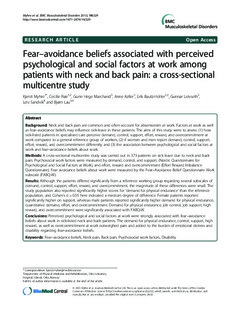| dc.description.abstract | Background: Neck and back pain are common and often account for absenteeism at work. Factors at work as well
as fear–avoidance beliefs may influence sick-leave in these patients. The aims of this study were to assess: (1) how
sick-listed patients in specialised care perceive demand, control, support, effort, reward, and overcommitment at
work compared to a general reference group of workers; (2) if women and men report demand, control, support,
effort, reward, and overcommitment differently; and (3) the association between psychological and social factors at
work and fear–avoidance beliefs about work.
Methods: A cross-sectional multicentre study was carried out in 373 patients on sick leave due to neck and back
pain. Psychosocial work factors were measured by demand, control, and support, (Nordic Questionnaire for
Psychological and Social Factors at Work), and effort, reward and overcommitment (Effort Reward Imbalance
Questionnaire). Fear avoidance beliefs about work were measured by the Fear–Avoidance Belief Questionnaire Work
subscale (FABQ-W).
Results: Although the patients differed significantly from a reference working group regarding several subscales of
demand, control, support, effort, reward, and overcommitment, the magnitude of these differences were small. The
study population also reported significantly higher scores for ‘demand for physical endurance’ than the reference
population, and Cohen’s d = 0.55 here indicated a medium degree of difference. Female patients reported
significantly higher on support, whereas male patients reported significantly higher demand for physical endurance,
quantitative demand, effort, and overcommitment. Demand for physical endurance, job control, job support, high
reward, and overcommitment were significantly associated with FABQ-W.
Conclusions: Perceived psychological and social factors at work were strongly associated with fear–avoidance
beliefs about work in sick-listed neck and back patients. The demand for physical endurance, control, support, high
reward, as well as overcommittment at work outweighed pain and added to the burden of emotional distress and
disability regarding fear–avoidance beliefs. | nb_NO |

